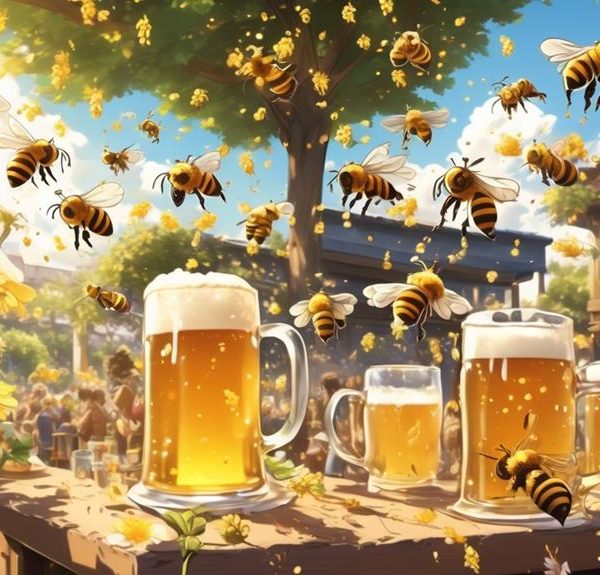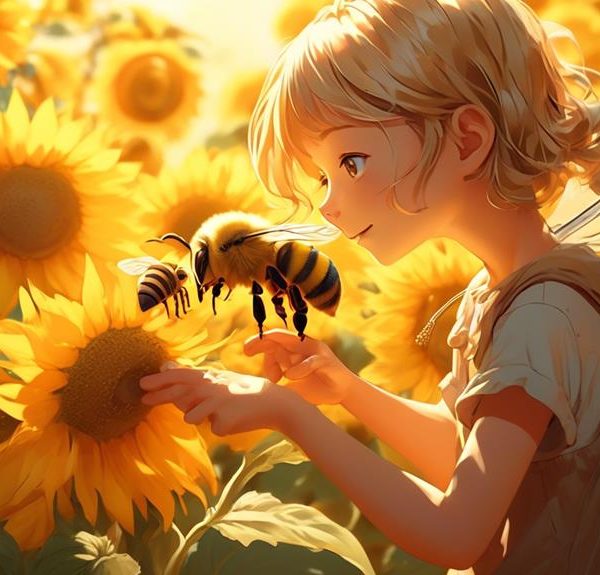Navigate the intriguing world of pollination as we delve into whether bees are attracted to the vibrant begonias in your garden.
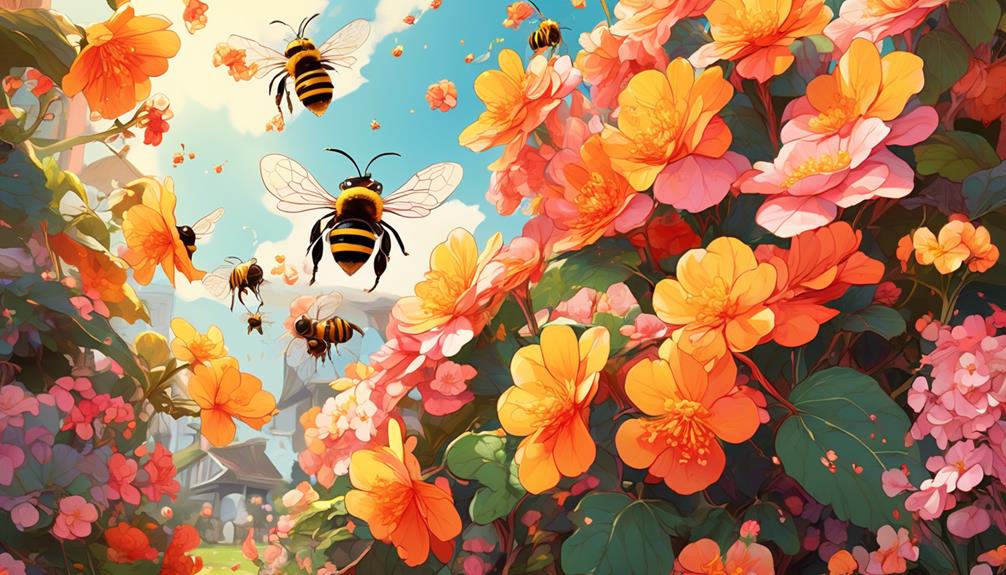
Do Bees Like Begonia
Wading through the world of gardening and pollination can often feel like navigating an intricate dance between flowers and their pollinators. You, as an avid gardener or nature enthusiast, might have found yourself wondering whether bees, those tireless workers of the pollination world, fancy the vibrant begonias you've carefully cultivated in your garden.
Bees are known to have their preferences when it comes to flowers, and understanding these preferences can be crucial for garden planning and beekeeping. But do begonias make the cut? Do they serve up the nectar in a way that's enticing for our buzzing friends? Now, that's a question worth exploring.
Key Takeaways
- Begonias, despite being self-pollinating, still attract bees with their vibrant colors and enticing aroma.
- Bees are attracted to begonias due to their association of bright colors with nectar.
- Factors such as flower shape, size, nectar content, and sugar concentration influence bee preference for begonias.
- Planting bee-friendly begonias not only enhances garden aesthetics but also supports bee populations and promotes biodiversity.
Understanding Begonias: A Brief Overview
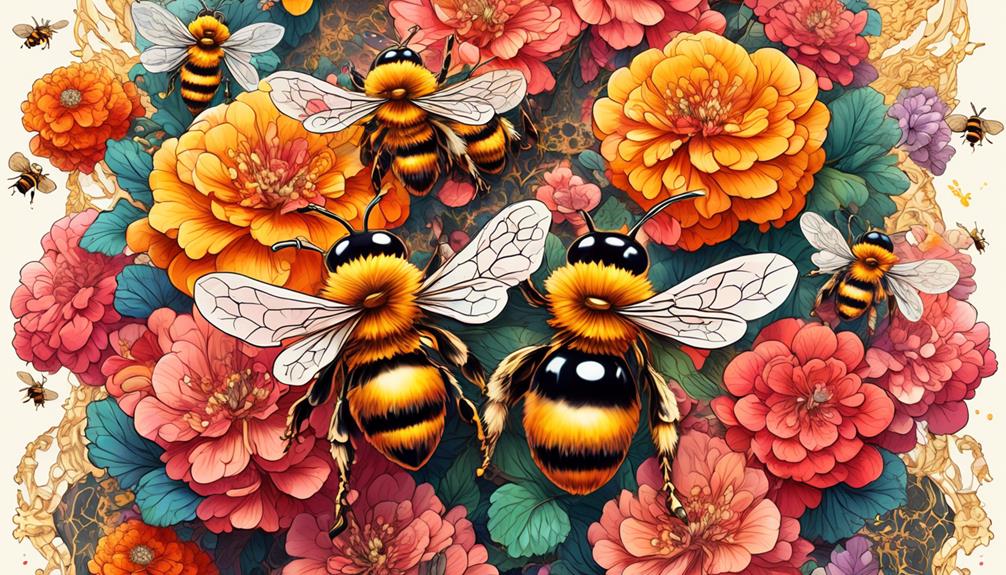
To fully grasp why bees may or may not be attracted to begonias, you've got to first understand the unique characteristics of these vibrant, broad-leaved plants.
Begonias, originating from tropical and subtropical regions, are renowned for their ornamental foliage and flowers, boasting a diverse spectrum of colors and patterns. You'll find over 1,800 species, each with a distinctive adaptation strategy, from enduring dry seasons to thriving in heavy rainfall.
Begonias are broadly categorized into three types: tuberous, semperflorens, and rhizomatous. Tuberous begonias, you'll notice, have large, dramatic flowers—perfect for attracting pollinators. Semperflorens, commonly known as wax begonias, are characterized by their waxy leaves and small, abundant flowers. Rhizomatous begonias, on the other hand, are grown primarily for their striking, diverse foliage rather than their inconspicuous flowers.
Crucial to your understanding is the fact that begonias are monoecious, meaning each plant has both male and female flowers. Interestingly, the male flowers are more showy and attractive, a clever strategy to lure pollinators. These factors, combined with their nectar production, could potentially make begonias attractive to bees. However, the attraction might vary based on bee species and other environmental factors.
The Importance of Bees in Pollination
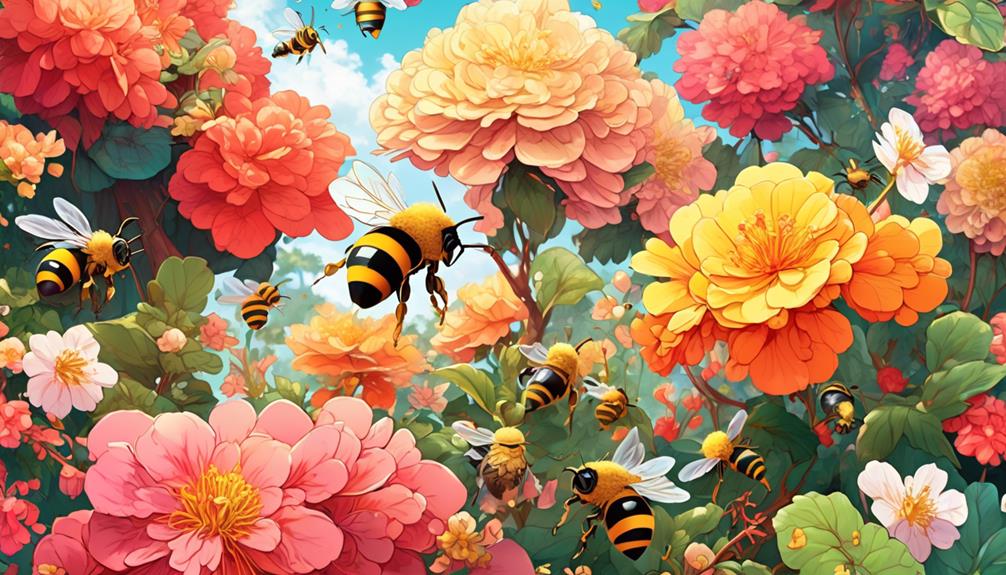
Understanding the role bees play in pollination is crucial, as these industrious insects are responsible for the fertilization of nearly 75% of the crops humans consume worldwide. Without their tireless labor, fruit and vegetable yields would significantly decrease, disrupting the global food supply. And it's not just our plates that'd be affected. Many plants in natural ecosystems also rely on bees for pollination, leading to a potential ecological imbalance.
You may wonder, why are bees so good at this job? The answer lies in their biology and behavior. Bees carry an electrostatic charge which helps pollen stick to their furry bodies. As they move from flower to flower, pollen grains rub off, fertilizing plants. They're also driven by a need to collect nectar, which leads them to visit numerous blossoms, maximizing the potential for cross-pollination.
Bees also have a unique 'waggle dance' they perform to communicate the location of high-quality flowers to their hive mates, ensuring efficient pollen collection. So, next time you see a bee buzzing around your begonias, appreciate the vital role it's playing in maintaining our ecosystems and food supply.
Begonias and Bees: An Attraction?
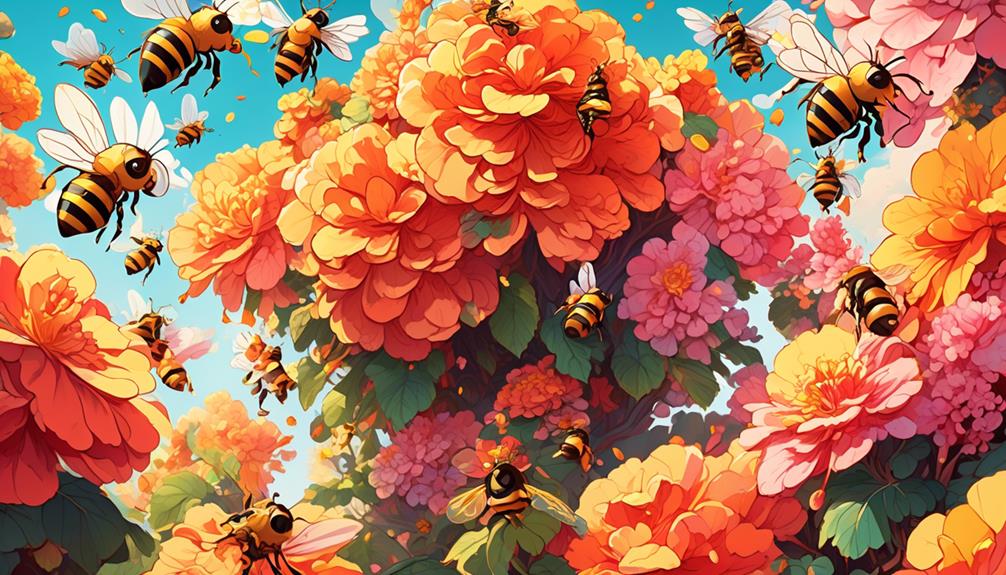
You might be curious if these hardworking bees are attracted to your begonias, and indeed, the relationship between bees and begonias is a fascinating one worth exploring. Here's the scoop: bees are integral to pollination, but begonias, interestingly enough, are self-pollinating plants. They don't need bees to reproduce, which makes you wonder if bees are attracted to them at all.
The answer isn't as clear-cut as you might think. While begonias don't rely on bees for pollination, bees are still attracted to them. But why? It's primarily due to the begonia's vibrant colors and enticing aroma. Bees, like many insects, are drawn to bright colors. They associate these colors with nectar, an essential food source.
Furthermore, begonias emit a captivating scent that bees find irresistible. This scent is part of the plant's survival strategy, luring in bees and other insects that might aid in spreading the pollen.
Factors Influencing Bees' Flower Preferences
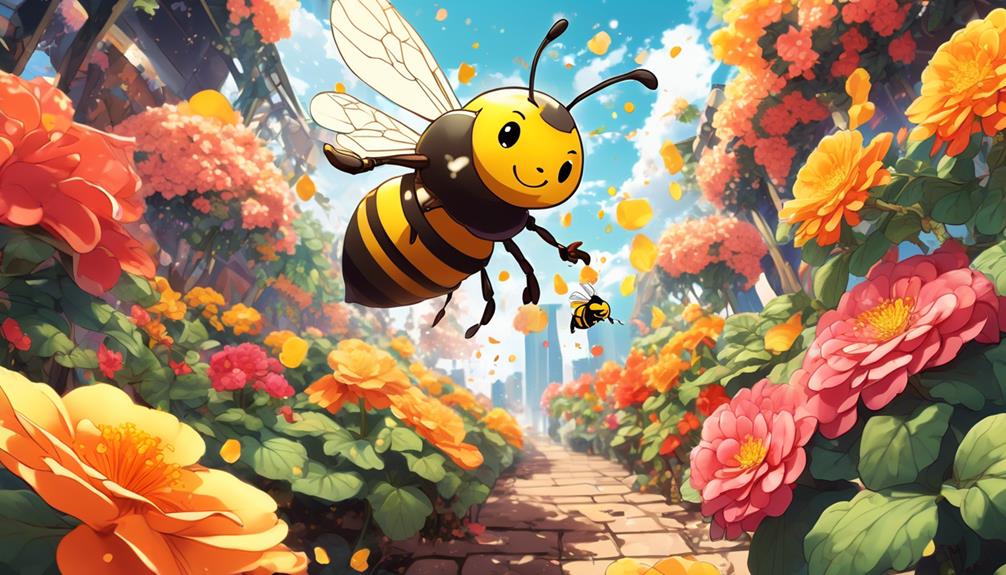
So, while begonias entice bees with their vivid hues and intoxicating scent, several other factors also play a significant role in a bee's flower preference. The shape and size of the flower are critical. Flowers with a landing platform, like daisies, are often more attractive to bees. They can land, collect nectar, and carry pollen easily.
The flower's nectar content and sugar concentration are also important. Bees need nectar as it's their primary energy source. High sugar concentration in nectar can attract more bees, ensuring the pollination process.
Temperature and weather conditions also influence a bee's preference. Bees are more active in warm, sunny conditions, and they're likely to visit flowers that absorb heat, like dark-colored ones. In contrast, they may avoid flowers in shaded or windy areas.
Lastly, the bee's species can determine flower preference. Some bees have evolved to prefer specific flowers, forming a unique relationship known as plant-pollinator mutualism.
The Role of Begonias in Beekeeping
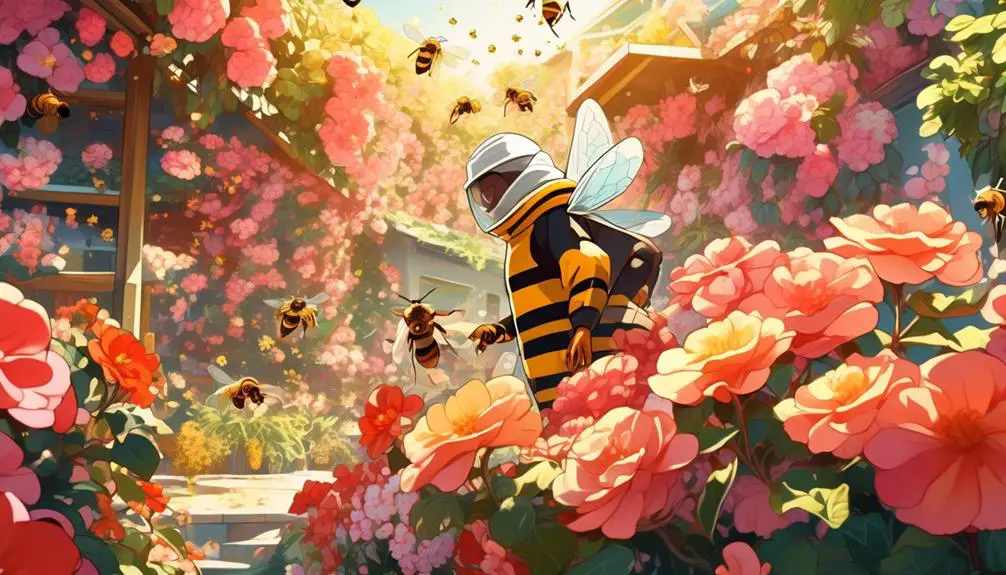
How do begonias, with their vibrant colors and captivating scent, factor into the world of beekeeping? You might be surprised to learn that they play an essential role in supporting healthy bee populations. Begonias, with their pollen and nectar-rich blooms, provide a rich food source for bees. This is crucial, especially in urban areas where natural food sources may be scarce.
In addition, the unique shape of begonia flowers can help bees hone their foraging skills. They offer a sort of 'training ground' for bees, enabling them to become more efficient pollinators.
Here's a simple table to highlight these points:
Role of Begonias | Impact on Bees |
|---|---|
Food Source | Provide nutrition from nectar and pollen |
Training Ground | Improve foraging skills |
Moreover, begonias' long blooming period ensures bees have a consistent food source. This can help sustain your bee colony throughout the season. You'll also reap the benefits – more bees mean more pollination, which can lead to a healthier, more productive garden. So, the next time you're planning your garden, don't forget the begonias. They're not just beautiful – they're bee-utiful!
Impact on Gardening: Bees and Begonias
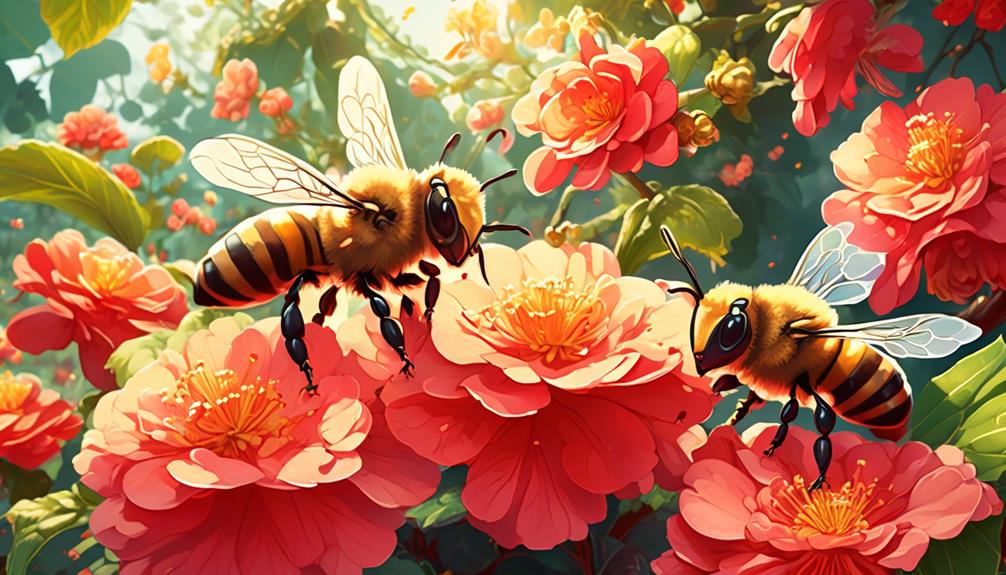
Having understood the crucial role of begonias in beekeeping, let's now explore their impact on gardening, particularly when bees are involved.
Begonias, with their vibrant blooms and lush foliage, can significantly enhance the aesthetic appeal of your garden. They're quite hardy, requiring minimal care, which makes them a popular choice among gardeners.
But it's not just about looks. Begonias are also brilliant for promoting biodiversity. When you plant them, you're providing a food source for bees, enhancing their survival chances. However, it's important to remember that not all begonias are equally attractive to bees.
Tuberous begonias, for instance, produce large, showy flowers but they don't offer much nectar or pollen. On the other hand, species like Begonia grandis attract bees with their abundant nectar and pollen supply. Therefore, if you're aiming to support bees, opt for these types of begonias.
This bee-friendly approach not only aids in bee conservation but also boosts your garden's health. Bees are excellent pollinators and their interaction with your plants enhances their productivity. Hence, bees and begonias together can create a win-win situation for you: a beautiful garden teeming with life and a safe haven for our buzzing friends.
Frequently Asked Questions
What Other Insects Are Attracted to Begonias?"
You're curious about what other insects are attracted to begonias, aren't you?
Well, besides bees, begonias also attract butterflies and hummingbirds due to their bright colors and sweet nectar.
However, they can also attract less welcome visitors like aphids, thrips, and slugs. These pests can cause damage to the plants.
It's always a good idea to monitor your begonias regularly to keep these uninvited guests in check.
How Can I Attract More Bees to My Garden With Other Plants?"
You're looking to attract more bees to your garden, right?
Well, bees are drawn to a variety of plants. They're particularly fond of bright, fragrant flowers like lavender, sunflowers, and daisies.
Plant these in your garden to create a bee-friendly environment.
Also, try to avoid using pesticides, as they can be harmful to bees.
Are There Any Negative Impacts on Bees From Visiting Begonias?"
No, there aren't any known negative impacts on bees from visiting begonias. Bees are attracted to begonias for their nectar and pollen, which are vital food sources.
However, not all begonias are equally attractive to bees. Some varieties may not offer as much nectar or pollen, but this doesn't harm the bees.
It's always a good idea to include a variety of bee-friendly plants in your garden to ensure they've plenty of food.
What Specific Species of Bees Are Most Attracted to Begonias?"
You're likely to spot several species of bees buzzing around begonias, but honeybees and bumblebees are particularly drawn to them. These bees are attracted to the bright colors and sweet nectar of begonias.
However, the specific preference can vary depending on the bee species' native region and the type of begonia. So, it's not just a question of 'do bees like begonias?' but 'which bees prefer which begonias?'
How Does the Climate or Season Affect Bees' Attraction to Begonias?"
You're right to consider climate and season. Warmer temperatures and sunny weather increase bees' activity, and thus their attraction to flowers like begonias.
However, the flowering time of begonias, usually in summer, also plays a part. Bees are more likely to be drawn to them during this period.
Conclusion
So, do bees like begonias?
The answer isn't straightforward. While begonias aren't their top choice, bees don't shun them completely. Factors like flower color, shape, and nectar availability play a role.
If you're a beekeeper or gardener, don't disregard begonias. They can offer a valuable food source for bees, especially when other flowers aren't in season.
Understanding the relationship between bees and begonias can help you create a bee-friendly environment.

